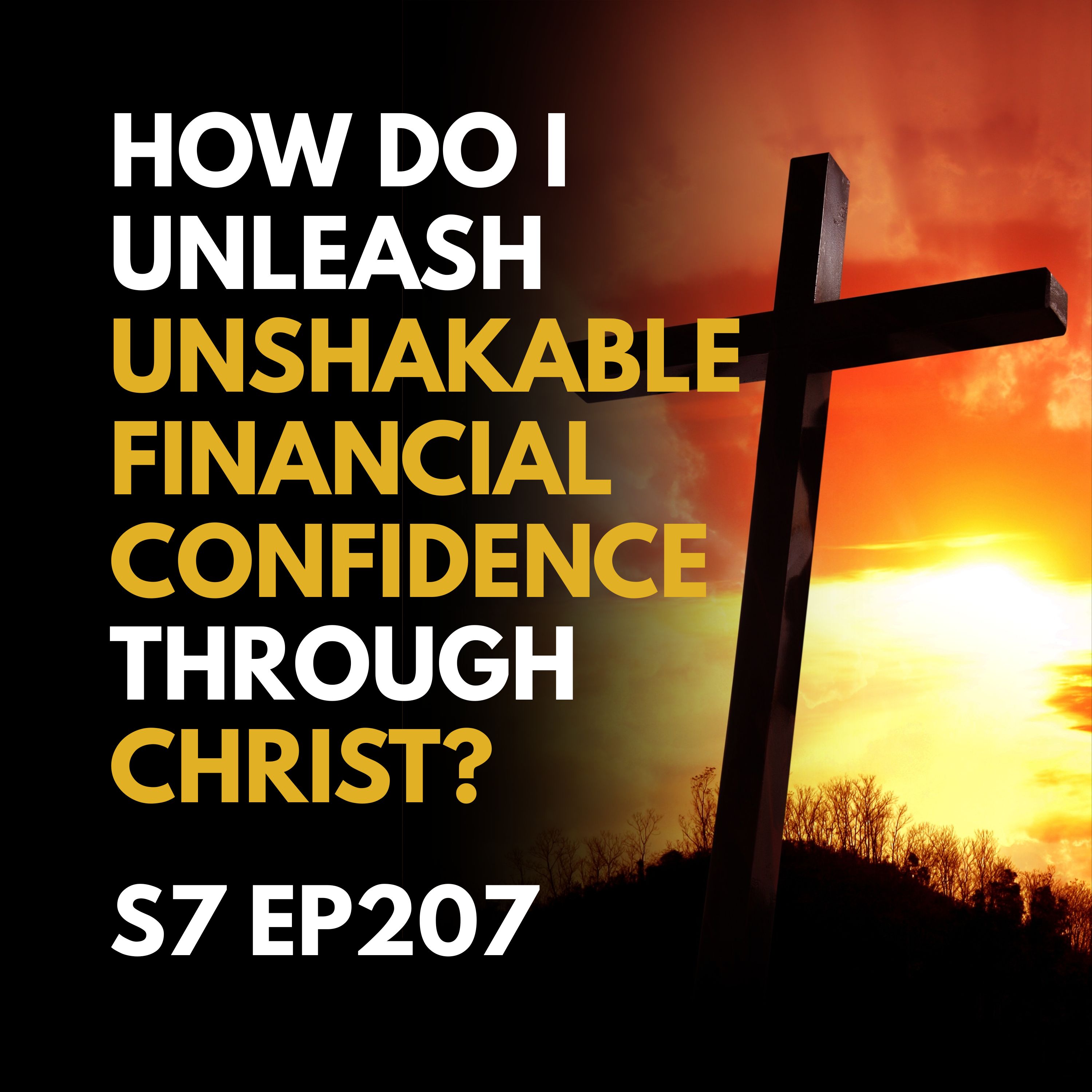Is Anchoring in Faith the Key to Financial Peace?

How to Unleash Unshakable Financial Confidence Through Christ
In a world full of uncertainty, many seek security through wealth, possessions, or systems of thought. However, these sources often fail to provide lasting peace. As Job reminds us, riches can disappear suddenly, revealing their inability to offer enduring assurance. When confidence is tied to unstable, external conditions, anxiety follows. Is Anchoring in Faith the Key to Financial Peace?
Introduction: Beyond Worldly Security – Finding True Confidence in Christ
True and unshakable confidence is found only in the eternal, unchanging nature of God and Jesus Christ. Scripture emphasizes that “Jesus Christ is the same yesterday, today, and forever” (Hebrews 13:8), and “I, the Lord, do not change” (Malachi 3:6). This divine immutability is a bedrock for real security. Unlike worldly foundations, Christ's unchanging character strengthens rather than weakens in adversity. Trusting in Him allows believers to maintain peace despite market crashes, inflation, job loss, or any other external instability.
God’s Sovereignty: The Bedrock of Financial Confidence
The path to true financial confidence begins with recognizing that God is the ultimate owner and provider. We are stewards, not owners. Psalm 24:1 proclaims, “The earth is the Lord’s, and everything in it.” This understanding shifts our mindset from scarcity to abundance, because God, the Source, is inexhaustible.
Scripture reassures us: “My God shall supply all your need according to His riches in glory by Christ Jesus” (Philippians 4:19). Even the ability to generate wealth is granted by Him (Deuteronomy 8:18). When believers face financial trials, it does not signal punishment but refinement. As James 1:2–4 teaches, trials develop perseverance and spiritual maturity.
Many testimonies affirm this: hardships such as illness or debt have drawn believers closer to God and taught them to depend on His strength. These refining seasons build the character and resilience necessary for future blessings.
Transforming Your Mindset: Overcoming Financial Fear and Scarcity
Financial fear isn’t always about a lack of money—it often reflects a spiritual misalignment. Jesus addresses this in Matthew 6:19–21, warning that where our treasure is, our heart will also be. Trusting in wealth rather than God creates anxiety because money is inherently unstable.
Serving money as a master leads to spiritual and emotional turmoil. Some Christians unknowingly carry a “poverty mindset,” rooted in fear, control, or guilt. This mindset can sabotage generosity and cultivate anxiety. The antidote is a reorientation of the heart toward God.
Scripture invites us to cast all our cares upon Him (1 Peter 5:7). Jesus reassures us that God knows our needs and will provide (Matthew 6:25–34). Cultivating gratitude and contentment liberates believers from comparison and the relentless pursuit of more. As Isaiah 26:3 says, “You will keep in perfect peace those whose minds are steadfast, because they trust in you.”
Pillars of Biblical Financial Stewardship
Biblical stewardship reframes all financial activity as a spiritual act. Since everything belongs to God, the real question is not “How much should I give?” but “How much should I keep?” This mindset encourages humility, accountability, and alignment with God’s purposes.
1. Generosity as Worship
Giving is an act of worship and trust. Malachi 3:10 encourages believers to test God by bringing the whole tithe into the storehouse and watch Him open the windows of heaven. Jesus emphasized a “firstfruits” approach, giving God the first and best portion of our income.
Generosity reflects God’s heart and demonstrates faith in His provision. Luke 6:38 teaches that giving results in blessing: “Give, and it will be given to you… For with the measure you use, it will be measured to you.”
2. Budgeting with Purpose
Budgeting is a form of spiritual discipline. As Jesus taught in Luke 14:28–30, one should count the cost before building. Creating a plan for income honors God and prevents waste. A biblical budget prioritizes giving, saving, and purposeful spending while avoiding excessive debt.
Popular guidelines include the 70/20/10 principle:
10% tithing/giving
20% saving/investing
70% living expenses
Tracking and allocating every dollar in alignment with God’s purposes creates margin, peace, and intentionality.
3. Strategic Saving
Saving is not a sign of distrust in God but an act of wisdom and foresight. Proverbs 21:20 praises those who store up for the future, while Proverbs 22:3 encourages preparation for potential difficulties.
A prudent savings plan includes:
Emergency funds (3–6 months of expenses)
Future giving opportunities
God-directed investments
Joseph’s example in Genesis 41 models strategic saving during years of plenty to prepare for famine.
4. Debt Freedom
Debt is described in Scripture as bondage (Proverbs 22:7). Avoiding unnecessary debt and aggressively working toward debt freedom brings peace and greater ability to give.
Paul urges, “Let no debt remain outstanding, except the continuing debt to love one another” (Romans 13:8). Strategies include reducing expenses, increasing income, selling unnecessary possessions, and avoiding impulse purchases.
Debt limits generosity and distracts from God’s purposes. Eliminating it fosters freedom and confidence.
The Power of the Holy Spirit in Financial Decisions
Financial stewardship isn’t only practical—it’s deeply spiritual. The Holy Spirit plays an essential role in providing wisdom, discernment, and peace in decision-making.
1. Inviting God into Every Financial Decision
Prayer is the primary way to invite God into financial matters. Rather than a last resort, prayer should be the starting point. Believers are encouraged to bring every decision—big or small—before God, asking for guidance and provision (Matthew 7:7).
Prayer brings peace by shifting the burden from self to God. It cultivates gratitude, reduces worry, and fosters a trusting relationship with the Provider.
2. Seeking Divine Wisdom and Discernment
The Holy Spirit provides wisdom through:
Illuminating Scripture
Inner conviction or peace
Godly counsel
Providential circumstances
He also convicts believers of greed, selfishness, or misaligned financial priorities. This divine feedback redirects choices toward stewardship, generosity, and kingdom impact.
When the Spirit leads, financial decisions move from reactive stress to proactive obedience. Trusting the Holy Spirit transforms money management into a faith journey.
Conclusion: Living in Unshakable Financial Confidence
Unshakable financial confidence in Christ comes not from wealth accumulation or perfect planning, but from a heart rooted in eternal truth. It’s a journey of reordering our trust, reshaping our mindset, and realigning our actions to reflect God’s sovereignty.
Key Takeaways:
Reorient your trust: Place confidence in God, not wealth or worldly systems. Jesus Christ is your unchanging foundation.
Embrace God’s sovereignty: Recognize Him as the true owner and provider. Steward His resources with faith and purpose.
Confront financial anxiety spiritually: Identify idols of security, cast your cares on God, and pursue peace through contentment.
Implement biblical stewardship principles: Prioritize generosity, budgeting, saving, and debt elimination to create a cycle of faith-fueled confidence.
Seek the Holy Spirit’s guidance: Make prayer and discernment part of every financial decision. God delights in guiding His people.
Financial storms will come, but those whose confidence is built on Christ will stand firm. The combination of spiritual surrender, practical wisdom, and divine partnership empowers believers to live with joy, peace, and unshakable financial confidence—no matter what life throws their way.












